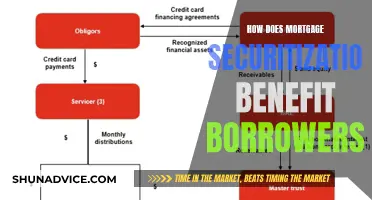
Becoming a mortgage advisor is a great career choice for those looking to enter the financial sector. It can be a rewarding and lucrative role, but it also comes with plenty of stresses, long hours, and paperwork. To become a mortgage advisor, you need to complete a regulatory qualification, such as the Certificate in Mortgage Advice and Practice (CeMAP), and gain some experience. CeMAP is the most well-known mortgage advisor qualification in the UK, and can be completed through a course or apprenticeship. The role requires strong communication and client-building skills, and a commitment to responsible and ethical lending practices.
| Characteristics | Values |
|---|---|
| Qualifications needed | Certificate in Mortgage Advice and Practice (CeMAP) |
| Prerequisites | No prerequisites, but a good level of English and mathematics is important, as well as excellent communication skills |
| Salary | Basic salary of £25,000-£30,000 p/a, but high earning potential with experience, bonuses, commissions and additional benefits |
| Working hours | Flexible, can set your own schedule |
| Work environment | Can work for an established financial institution or independently as a self-employed advisor |
| Job market | Steady demand for mortgage advisors regardless of market conditions |
| Career progression | Can progress to senior advisor, management, or other roles in financial institutions |
| Job role | Advising clients on mortgage options, assessing affordability, researching mortgage products, providing advice, assisting with applications, administrative work |
| Additional skills | Sales skills, empathy, active listening, customer service skills |
| Training | Can be completed through a course, apprenticeship, or on-the-job training |
What You'll Learn

Qualifications
To become a mortgage advisor, you need to obtain relevant qualifications. The Certificate in Mortgage Advice and Practice (CeMAP) is widely recognised as the standard qualification for mortgage advisors. It is a Level 3 qualification, equivalent to an A Level, and is approved by the Financial Conduct Authority (FCA). The FCA moderates and regulates the conduct of individuals, businesses, and the economy across the UK. The CeMAP qualification provides essential knowledge and understanding of mortgage products, regulations, and the process of providing advice. It is an excellent entry point for those without prior experience or a degree in the financial services sector, as there are no formal entry requirements. However, individuals should have good English and Maths skills, and excellent communication skills are also important.
The CeMAP qualification can be pursued through an employer or independently. It consists of three modules with multiple-choice exams that can be completed online. There are various providers of the CeMAP qualification, including Simply Academy and uAcademy, which offer flexible learning methods such as classroom learning, live webinars, and self-paced e-learning.
Alternative qualifications to the CeMAP include the Level 3 Certificate in Mortgage Advice offered by the Chartered Insurance Institute (CII). The Diploma for Financial Advisers (DipFA) is another approved qualification by the FCA and is a minimum requirement to become a financial adviser.
In addition to qualifications, work experience in customer service, accountancy, or finance can be beneficial. Networking and mentorships are also important for career development and can help individuals stay successful and up-to-date with industry trends.
Mitigating Risk: Strategies in the Mortgage Industry
You may want to see also

Skills
To become a successful mortgage advisor, you need to possess a wide range of skills and knowledge.
First and foremost, a solid understanding of the financial world, including mortgages, insurance, and investments, is essential. This knowledge will enable you to guide your clients through the complex world of mortgages and help them make sense of home loans. It is also crucial to stay updated with the constantly evolving mortgage industry, keeping abreast of changes in regulations and market conditions.
Excellent communication skills are a must. Mortgage advisors need to be adept at explaining complex financial concepts in a simple, easy-to-understand manner. Active listening skills are vital, as advisors must understand their clients' financial situations and tailor their advice accordingly. Confidence and determination are also key attributes, enabling advisors to effectively discuss financial options and explain repayment processes.
Additionally, organisational and time management skills are important, especially for self-employed advisors who work from home. The ability to juggle multiple clients and manage competing demands requires organisation and a strong work ethic.
Transferable skills from other roles, such as customer service or sales, can also be beneficial. These skills can enhance your understanding of client needs and improve your ability to provide tailored advice.
Finally, a certain level of proficiency with computers and technology is necessary. This includes using relevant software and staying connected with clients and colleagues.
Refinancing Your Mortgage: A Guide to Lowering Payments
You may want to see also

Rewards
Being a mortgage advisor can be a rewarding career choice. Here are some of the benefits:
Financial rewards
Mortgage advisors can earn a good salary, with an average of £42,498.89 per year and a maximum of £72,000 per year. They may also receive additional benefits, such as bonuses and commission. For those who are self-employed, they have the freedom to set their own fees and enjoy the flexibility of being their own boss. However, they also need to consider various expenses, such as taxes, insurance, and marketing costs.
Personal satisfaction
Helping people navigate the complex world of mortgages and achieve their dream of owning a home can be incredibly fulfilling. Mortgage advisors play a crucial role in guiding individuals through the intricate process of obtaining a home loan, making it a rewarding career where you can directly impact people's lives.
Career development
The mortgage industry is constantly evolving, providing opportunities for ongoing learning and development. Mortgage advisors need to stay updated with market conditions, regulations, and product offerings, ensuring they are always expanding their knowledge. Additionally, there are various qualifications and certifications, such as the CeMAP and diploma programs, that can enhance your skills and make you more competitive in the job market.
Transferable skills
The skills gained as a mortgage advisor, such as financial analysis, customer service, and communication, are highly transferable and valued across various industries. This opens up opportunities for career progression and diversification, allowing you to explore different paths within the finance sector or even start your own business.
Flexible career path
There are multiple ways to become a mortgage advisor, making it an accessible career choice. You don't necessarily need a degree, and prior work experience in customer service or finance can be a great advantage. Apprenticeships and trainee schemes offered by financial institutions provide a combination of on-the-job training and mentorship, allowing you to build your skills while you work towards qualifying.
Mortgage-Backed Securities: Boosting Economy Through Homeownership
You may want to see also

Challenges
While becoming a mortgage advisor can be a rewarding career, there are several challenges that one may encounter. Here are some of the key challenges to consider:
Qualifications and Training
Obtaining the necessary qualifications and training can be demanding. The most common and essential qualification in the UK is the Certificate in Mortgage Advice and Practice (CeMAP). This qualification consists of three modules or papers, each with its own exam, and covers a range of topics such as financial services, regulations, ethics, and mortgage advice. While the course can be completed in as little as six months, it requires a significant amount of study and dedication. There are also costs associated with obtaining this qualification, which can be a challenge for those who are not already employed in the industry.
Work Experience and Transferable Skills
Gaining relevant work experience or transferable skills is crucial for aspiring mortgage advisors. Many employers look for candidates with a background in finance, sales, or customer service, particularly in banks or financial institutions. For those without prior work experience, trainee schemes and apprenticeships are available, but even then, it can be challenging to build up the necessary competencies and knowledge to advise clients confidently.
Regulatory and Compliance Requirements
Mortgage advisors must adhere to strict regulations and compliance standards set by the Financial Conduct Authority (FCA). This includes registering with the FCA, demonstrating competency, and staying up-to-date with ongoing professional development. Failure to comply with these requirements can result in penalties or loss of authorisation to provide mortgage advice.
Demanding Workload and Client Management
The role of a mortgage advisor can be fast-paced and demanding. Advisors often juggle multiple clients with different needs and demands, requiring excellent organisation and time management skills. They must also keep themselves informed about the latest mortgage products, providers, and changes in the law to provide accurate and timely advice. Self-employed mortgage advisors face additional challenges, such as building a client base, handling administrative tasks, and managing their own finances and expenses.
Criminal Record and Credit Checks
Mortgage advisors may have contact with vulnerable individuals, so they are typically required to undergo criminal record checks. A criminal record, caution, warning, or conviction may impact an individual's ability to secure employment in this field. Additionally, some employers may also require credit checks to assess an applicant's financial responsibility and trustworthiness.
Calculating Mortgage Rates: Understanding Your Costs
You may want to see also

Career progression
The career progression for a mortgage advisor can vary depending on their qualifications, experience, and career goals. Here are some common steps and pathways for those pursuing a career as a mortgage advisor:
Education and Qualifications: Obtaining the necessary qualifications is the first step towards becoming a mortgage advisor. The most common and widely recognised qualification is the Certificate in Mortgage Advice and Practice (CeMAP). This qualification is divided into three parts, covering various aspects of mortgage advice and practice. Completing this qualification can provide a strong foundation for a career as a mortgage advisor. It is also beneficial to have a degree in a related field, such as finance, economics, business, or accounting, as this can enhance your knowledge and competitiveness in the job market.
Entry-level Positions: Once you have obtained the necessary qualifications, you can start applying for entry-level positions as a mortgage advisor. Many financial institutions offer trainee schemes and apprenticeship programmes that provide a combination of on-the-job training, mentorship, and practical experience. These programmes can last anywhere from six months to two years and are an excellent way to gain the knowledge and skills needed to become a successful mortgage advisor. During this time, you will learn about the different types of mortgages, analyse the market, and develop an understanding of the financial situations of your clients.
Authorisation and Registration: In the UK, it is essential to obtain authorisation from the Financial Conduct Authority (FCA) to provide mortgage advice. The FCA sets and enforces standards and regulations to ensure customer protection. You will need to demonstrate your competency and adherence to industry regulations to obtain this regulatory approval. Additionally, registering with the FCA as an 'approved person' is crucial, as it allows you to legally provide mortgage advice.
Ongoing Professional Development: To maintain your competence and stay up-to-date with industry changes, ongoing professional development is essential. This can include taking additional courses, attending seminars, and staying informed about changes in mortgage regulations and market conditions. By continuously expanding your knowledge and skills, you can enhance your career prospects and better serve your clients.
Specialisation and Advancement: As you gain experience as a mortgage advisor, you may choose to specialise in a particular area of mortgage advice, such as residential mortgages, commercial mortgages, or a specific client demographic. Specialising can lead to advanced certifications, such as the Certificate in Advanced Mortgage Advice, which validates your ability to handle complex financial circumstances. With experience and additional qualifications, you can advance your career, take on more complex cases, and even move into management or leadership roles within your organisation.
Self-employment: Some mortgage advisors may choose to work independently and start their own businesses. This path offers the freedom to be your own boss, set your own fees, and create a personalised service for your clients. However, self-employment also comes with additional responsibilities, such as advertising, building a client base, and managing various business costs.
Assuming a Mortgage: Is It Really a Breeze?
You may want to see also
Frequently asked questions
The Certificate in Mortgage Advice and Practice (CeMAP) is the most well-known qualification for mortgage advisors in the UK. It is recognised by the Financial Conduct Authority (FCA) and can be completed through a training provider or pursued independently.
No, a degree is not mandatory to become a mortgage advisor. However, certain degrees can provide a solid foundation for the role, including degrees in real estate, finance, business, and accountancy.
Strong communication skills are essential for the role of a mortgage advisor, as it involves dealing with a variety of people, from clients to lenders. Sales skills are also important, as mortgage advisors need to explain complex financial information in a simple and easy-to-understand way.
Apprenticeships and training schemes are a great way to gain practical experience in the field. Networking and connecting with experienced professionals in the industry can also help provide mentorship and guidance.







